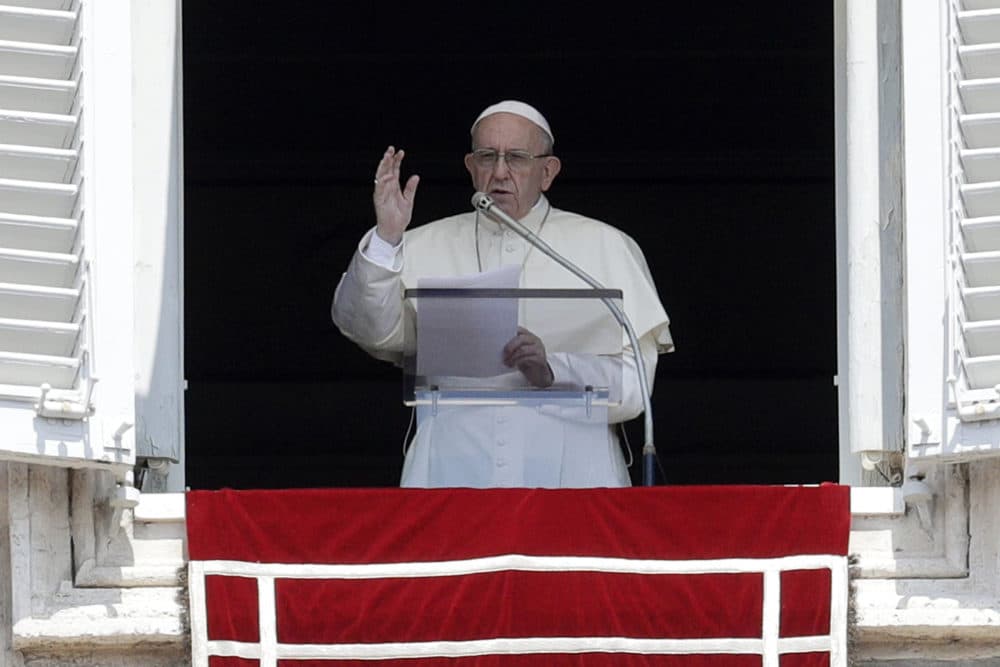Advertisement
Commentary
Don't Expect The Pope's Edict To Sway Opinions About The Death Penalty

“Groundbreaking,” declared The Atlantic after Pope Francis pronounced the death penalty morally unacceptable in all cases.
“A definitive change in church teaching that is likely to challenge Catholic politicians, judges and officials,” the New York Times weighed in. CNN agreed that Francis’ move last week “raises new questions about how politicians, particularly conservative Catholics in red states, will navigate the church's revised stance.”
Easily, I’d surmise.
Permit this practicing Catholic a contrarian view. I don’t think Francis’ position (with which I agree) will move opinion in the United States or seriously discomfort pro-execution politicians, for two reasons.
First, American Catholics often disagree with the Church’s social teaching, and Catholic politicians, who answer to a higher power than even the pope (voters), learned long ago how to finesse their disputes with Rome. The modern exemplar was New York Gov. Mario Cuomo, who in the 1980s patented the mantra of I’m personally against abortion but won’t force my beliefs on others.
Second, Francis has only tweaked the church’s all-but-ironclad opposition to the sentence of death. Many Catholics may be surprised to learn that there was any wiggle room on the subject at all.
The Catechism (the Church’s official teachings) formerly sanctioned capital punishment “if this is the only possible way of effectively defending human lives against the unjust aggressor.” If you were unaware of that loophole, don’t feel bad: Decades of statements by Church leaders, popes included, undercut the Catechism’s exception.
“I renew the appeal I made … for a consensus to end the death penalty, which is both cruel and unnecessary,” John Paul II said in 1999. Long before, in 1980, the U.S. Conference of Catholic Bishops had called for abolition of the death penalty, a stance it reaffirmed in 2005.
Many Catholics have long dissented, respectfully but fervently, from Vatican teachings.
Francis himself long condemned execution, last year deeming it “inadmissible because it is an attack on the inviolability and dignity of the person.”
In short, the pope didn’t take an open door to capital punishment and shut it. He shut a door that was barely ajar; you’d have to be flatworm-thin to wriggle through as a pro-capital punishment Catholic.
Some tried. The late Supreme Court Justice Antonin Scalia once said, “If I thought that Catholic doctrine held the death penalty to be immoral, I would resign.” As a traditionalist Catholic, Scalia had to rationalize his way past those numerous church condemnations that made plain the hierarchy’s abhorrence of capital punishment.
Even the old Catechism frowned on execution in most cases — with good reason. The inevitable innocents mistakenly put to death and racial bias, plus the possibility of gruesomely bollixed executions, convince many of us that this penalty indeed should be “inadmissible.”
This brings me back to my first point: Many Catholics have long dissented, respectfully but fervently, from Vatican teachings. That disagreement is overwhelming on matters like birth control and gay marriage, while abortion yields a split decision.
Despite all the Church hierarchy’s anti-capital punishment pleas, 53 percent of Catholics support the death penalty. They’re part of a national majority that, little more than a decade ago, claimed two thirds of all Americans, only to drop to 49 percent in 2016 — the lowest level of support for capital punishment in 40 years — before climbing to 54 percent today.
Despite all the Church hierarchy’s anti-capital punishment pleas, 53 percent of Catholics support the death penalty.
These swings in attitude, a criminologist speculated to the Washington Post, might reflect ongoing ambivalence about the ultimate punishment; changes in crime rates; publicity about death row exonerations; and/or the nation’s growing Hispanic population, which leans anti-execution. Papal pronouncements didn’t enter into his calculus.
Indeed, the Church is not as dictatorial about dissent as some presume. It permits Catholics who disagree with its teachings to follow their informed conscience (emphasis on “informed”). The Vatican has even allowed Catholic scholars to speculate that Jesus’s virgin birth was theology rather than actual history.
The doctrine of “papal infallibility” has been invoked just twice on theological matters: that Mary was born free of original sin and was bodily assumed into heaven.
Traditionalists bemoan “cafeteria Catholics” who pick and choose which doctrines to support. Yet last year, in a book published by the Catholic publishing house, Ignatius Press, two scholars argued that the death penalty accorded with Catholic theology and scripture, the blatant horror with which popes, bishops, and the Catechism regarded the state taking life notwithstanding. Perhaps conservatives will refuse Francis's new cafeteria serving of abolition, finding capital punishment more to their taste.
I for one won’t condemn them for exercising their informed conscience. American Catholics always do.
